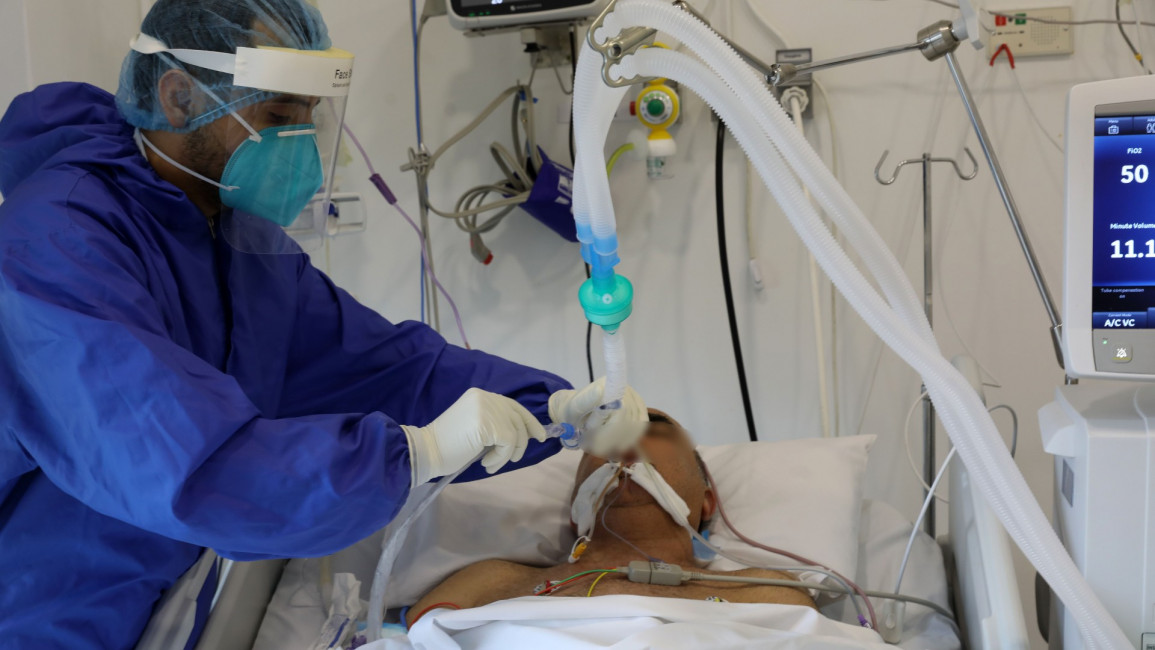Follow us on Facebook, Twitter and Instagram to stay connected
Charity campaigns for more oxygen in Lebanon hospitals amid alarming rise in coronavirus cases
Charity campaigns for more oxygen in Lebanon hospitals amid alarming rise in coronavirus cases
Lebanon is suffering from a severe Covid-19 spike and authorities have imposed a curfew in a desperate attempt to contain the virus.
4 min read
Lebanon now has one of the highest rates of Covid-19 infection per capita [Getty]
A Beirut social initiative is desperately calling for donations to help purchase more oxygen machines for hospitals, as Lebanon goes into an emergency lockdown to contain the spread of Covid-19.
Lebanon is now the country worst affected by coronavirus in the Middle East, and one of the worst-hit countries in the world.
Lebanon is now the country worst affected by coronavirus in the Middle East, and one of the worst-hit countries in the world.
"We need your help. People are dying due to the lack of oxygen. So we ask you to help us find oxygen machines. If you know any supplier, let us to know to help the people in need," the Baytna Baytak initiative wrote on Instagram, where it conducts many of its fundraising and social awareness efforts.
A Middle East-wide oxygen machine and ventilator shortage has hit Lebanon particularly hard, as it entered an 11-day curfew in order to reduce pressure on its healthcare system, which is struggling hard to cope with Covid-19 cases.
The World Health Organisation said on Thursday that Intensive Care Unit beds across the country had reached 94 per cent capacity while regular beds were at 85 per cent capacity.
Infections have reached an all-time high of nearly 5,500 cases a day in a country of little more than six million.
The country has one of the highest rates of Covid-19 per capita in the world, and the most recent iteration of the lockdown requires residents to request permission for a one-hour-long permit to leave the house for "emergencies".
This includes going to the bakery, pharmacist, airport or hospital, while supermarkets have closed and are only available for home delivery.
UK variant and a sharp rise in cases
While Lebanon managed to keep cases to an average of less than 100 per day until last August, it now leads the Arab world in number of cases per million people.
Today, the number of daily Covid-19 deaths is more than 13 times what it was in July.
|
Health authorities at the end of December confirmed that Lebanon had its first cases of the highly infectious UK variant of the virus, prompting speculation that this may be part of the reason for the sharp spike in cases.
On Thursday, Lebanon registered a new daily record of 41 deaths, bringing the overall number of recorded cases to nearly 237,200 and the number of deaths to 1,781, according to the Health Ministry.
The rise in coronavirus cases began in late August, a few weeks after the massive explosion at the Beirut port that destroyed parts of the capital, including several hospitals with virus patients.
Read more: Why 2021 could be an even worse year for the Middle East
The virus surged in the chaos of inundated hospitals, funerals and protests that followed the explosion.
Vaccine struggles
While its neighbours begin vaccinating their populations — including Israel whose campaign promises to be among the world's speediest — Lebanon has yet to secure a first batch of shots.
Once a leader in the health sector among Middle Eastern countries, Lebanon has been stymied in its effort to obtain vaccines by repeated bureaucratic delays.
These are partly due to the fact that it has a caretaker administration, rather than a permanent government.
Parliament is expected to meet on Friday to vote on a draft law to allow importing the Pfizer-BioNTech vaccine, with the first deliveries expected to arrive next month.
Sami Hanna, a 42-year-old businessman, blamed the country's political class for the surge in coronavirus cases.
"This is the result of deliberate decisions made by irresponsible and immoral politicians," he said as he waited for his turn to enter a pharmacy earlier this week, looking for pain relief medication, antidepressants and blood pressure medicine for his elderly parents.
Halim Shebaya, a political analyst, said the government still has no clear strategy and cautioned that it would be difficult to bring the numbers down this late in the game.
"The main issue now is the absence of trust in the government and authorities and managing a pandemic necessitates the presence of public trust in measures taken by the authorities," he said.



